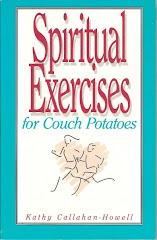On
the other hand, they had previously had single women in an earlier era start
churches and pastor, and currently had a pastoral couple, but were confused
about a married woman whose husband wasn’t ordained. My husband worked in youth
para-church ministry, so they tried to ordain him, that would have fit their
categories, to make us a clergy couple. But when he discovered the process required a church appointment,
my husband left the system and remained a lay person.
Church
planting avoided several pitfalls for women in ministry. As I knocked on doors
recruiting people to attend our new congregation, many were surprised to hear
of a woman pastor. The non-churched folks found it refreshing, they would say
things like, “Well women do everything else now.” Or, “I have a woman doctor,
why not?” Or more importantly they would have had a negative or even abusive
experience with a male pastor, and I didn’t trigger those associations.
The
only people with issues were those who had been taught this was unbiblical, and
since these were folks of faith with their own church already, I wasn’t trying
to recruit them anyway. So I didn’t have to deal with the expectations of a
congregation changing from a male to a female pastor.
Not
long after starting the church I became pregnant with our first child. So our
family grew along with the church. This gave me the option of caring for my
children while pastoring, especially because the laypeople had no prior
expectation of hours I would spend at the church building or other such
conflicts. In fact, I had to beg them to tell me things like they had gone in
the hospital. One dear old saint would not tell me this, and I told her to let
me know, because I could work it out to visit, and could certainly pray.
One
of the most challenging experiences I had came from an already Christian couple
who became leaders in the early years. We worked together for ten years but the
wife never fully accepted my leadership as she had grown up in a church that
taught women could not be pastors. Her husband supported me fully and was one
of my key leaders. She had many talents and used them well in the church but could
never fully see me as her pastor. After ten years they chose to attend a
different church, leaving quite a gap.
For
the most part, I have found my role in my local church without much controversy
since I started my own congregation. I did fight some battles in the
conference, one was an extra year added to the ordination process. As our
leadership of the conference changed to a superintendent whose wife pastors
(that original clergy couple from when I started) I noticed such a change in
attitude in my conference and a corresponding increase in female pastors and
leaders.
Not all my women friends experienced a smooth path so I often found myself advocating for women
in other conferences and settings. A male pastor friend started the ordination
process with me while we were in seminary together. He married a woman
from another denomination who worked full-time as an ordained chaplain. When
she sought ordination now in her husband’s conference, the leadership feared
ordaining her would lead to all the pastors’ wives seeking ordination. Not all
of them would want it, but if they could satisfy the requirements, why not? And
how did that possibility negate the reality of her being well suited for
ministry?
Meanwhile
my own four children grew up with a female pastor as their only experience. One
of my favorite stories involves the daughter of a pastor from our conference
who lived with us one semester while attending school. My own daughter
protested when I explained her father was a pastor. “But daddies can’t be pastors!”
Although I knew I had to burst her bubble, for one delicious moment women had
the priority in her world.
When
those same four grew up and left for college, they had to make their own
decisions about faith and issues like drinking or homosexuality. But I realized
that the one non-negotiable for me remained women in ministry. To deny that
possibility equaled denying my very purpose. I need not fear however. My daughter
Junia spent her first weekend at college defending her own name and her
namesake’s significance as a woman apostle.
As
my children have moved to different cities and searched for churches, I’ve been
amazed at the new and relevant church plants, often with racial diversity and the most hip features, that nevertheless deny the possibility of women in
leadership. I am grateful for our denomination’s founder who wrote a treatise
defending the ordination of women two centuries ago. If only we could all live
up to his insights. I look for the day when little girls and little boys and those of all races see people like them represented in all the roles God gives.




